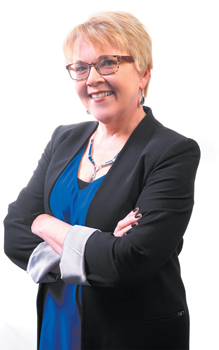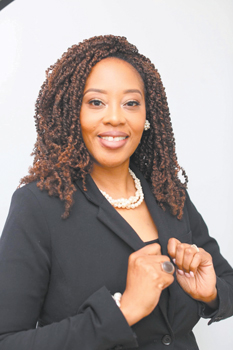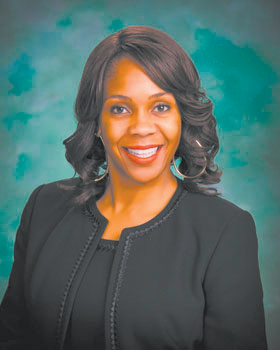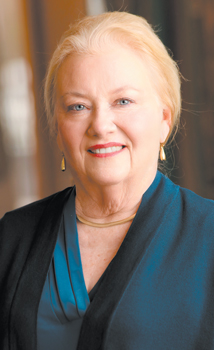The fabric of our community is made up of a diverse group of people who bring their individuality, skills, hard work and determination to the table. These contributions that each offers create a bounty of opportunities for anyone seeking them. A constant influx of new ideas, exciting entertainment, excellent educational opportunities, innovative business ventures, medical advancements and more make Cumberland County stand out. In a transient community, the importance of having people who consistently invest their time and energy into the area is magnitudinous. Whether working quietly behind the scenes or from a larger platform, the movers and shakers here deserve recognition for the difference they make every day. Among these people are Marge Betley, Kenjuana McCray, Tisha Waddell, Elizabeth Blevins and Diane Wheatley — five extraordinary women to watch in 2020 who are making a difference in our community.
 Marge Betley
Marge Betley
Major Gifts Officer at the
Cape Fear Valley Health Foundation
Q. Tell our readers about yourself, including how you came to be in Fayetteville.
A. I arrived in Fayetteville on the night of April 26, 2019 — less than a year ago. I followed shortly on the heels of my husband, Greg Weber, whose role as the new CEO and president of the Arts Council began last March. I pulled into Fayetteville late on a Friday night, and the next day we went to the Dogwood Festival. It was a great introduction to my new city.
Q. There are so many ways to serve the community we live in. What made you choose the route you did?
A. Greg and I are both very committed to community service and volunteerism — it’s part of what gives us a sense of belonging, and it is also how we have made some of our deepest friendships over the years.My job at Cape Fear Valley Health Foundation is my primary way of serving the Fayetteville community. I’ve been fortunate to have a very rich working life in the nonprofit sector, so when we moved here, I looked for some way to make a meaningful impact. Cape Fear Valley Health and the Health Foundation provide a huge amount of community benefit every year — from charity care and free health screenings to free mammograms for uninsured women, financial support for our cancer patients in financial need and so much more that many people are really unaware of. As I learned more about them, I knew I wanted to be a part of their impact in this community. And now, Cape Fear Valley’s residency program is creating a pipeline to bring hundreds of new physicians to our region — an impact that will be felt for generations to come. How could I resist?
Q. What do you love about this community?
A. Where do I start? Fayetteville is friendly, it’s welcoming and there is always something to do. I love to explore foods and cultures from around the world, so I’ve really enjoyed the festivals here — from the Caribbean Festival — best jerk chicken ever — to the African World Peace Festival and, of course, the International Folk Festival. I love the vibrancy of the arts community here — there’s terrific theater, music and visual arts. I even started taking a silversmithing class at Fayetteville Tech from jewelry artist Gail Ferguson, which I am really enjoying.Another thing that I love about Fayetteville is that when people see a need, they just step up and take action. Last August I attended an event called Cut My City — stylists from all over Fayetteville volunteer their time to provide haircuts and scalp checks for kids before school starts. A haircut sounds like such a simple thing, but it’s so important for a child to feel confident and optimistic as they start a new school year. There were hundreds of kids there and they were all buzzing with energy and enthusiasm! I love that I live in a city where someone sees a need and creates the path to deliver a solution.
 Kenjuana McCray
Kenjuana McCray
Hope Mills Mayor Pro Tem
and full-time professor at Fayetteville Technical Community College
Q. What’s something about our community that you want more people to know about?
A. I wish more people knew about the arts, services, activities and programs that are available in our community. I think we operate in a lot of silos, which prevents us from taking advantage of the many opportunities provided throughout the town of Hope Mills … I also wish more people knew about the stellar post-secondary opportunities in our overall community to include FTCC, Methodist University and Fayetteville State University. The Local FSU Hometown Alumni Chapter hosts an annual Little Mister and Miss Pageant each year. This pageant not only is a fundraiser to award scholarships for FSU students, but the pageant committee works with the children well beyond the pageant to help to promote emotional, social and leadership skills. I operate a small food pantry at FTCC to help serve students who suffer from food insecurity on campus. Food insecurity on college campuses is a growing concern, and I would like to help decrease this issue as much as possible. My hope is to widely expand this effort by creating programs that provide more healthy meal options for college students.
We Are the Arts, which is an Arts Council of Fayetteville/Cumberland County initiative, strives to increase tourism, economic development and innovation by promoting the vibrant arts and cultural happenings in the community and in our region. There is also a newly created Hope Mills Creative Arts Council and the town of Hope Mills staff also has an Arts and Culture Committee to help generate ideas for more cultural opportunities in our local community. Examples of these efforts in Hope Mills include the monthly food truck rodeos on the first Thursday of each month in the spring, which usually has a theme tied to community engagement. Hope Mills also hosts a farmers market on every first Saturday of the month in the spring and is geared toward not only engaging local produce farmers but also providing our citizens with more healthy food choices. Our communities are stronger when we connect together!
 Tisha Waddell
Tisha Waddell
District 3 City Councilwoman
Q. Tell our readers about yourself, including how you came to be in Fayetteville.
A. I am a very optimistic person who loves a great project! I’m thoughtful, creative and full of wonder. I collaborate easily and recognize the value of partnerships. I’ve experienced my greatest success as a result of positive connections. I came to Fayetteville as the daughter of the military. My mother retired here, and this became our final “home of record” and my longest home of choice.
Q. What do you love about this community?
A. I love the people in this community. They are so intricately woven together in the most unique ways. When I ran for office I began to learn about the history of the city first hand from the stories of the people I started interacting with and noticed that Fayetteville’s history is truly a part of the fabric of its present. I also love the pace of our city. It isn’t so slow that I’m bored, but it isn’t so fast-paced that it’s uncomfortable. Our former slogan really summed up the community perfectly, “History, Heroes and a Hometown Feeling.” That’s what I love about this community!
Q. There are so many ways to serve the community we live in. What made you choose the route you did?
A. Very candidly, this route chose me. I was in service for many years in very private ways. I’m a firm believer that we will be rewarded openly for what we do privately, and so I never sought to be the center of the city’s attention. It is still a little awkward to be so regarded for just doing what comes naturally. I am grateful to the citizens of District 3 and the city who place their confidence in me as a representation of them. It’s the best job I’ve ever had.
 Diane Wheatley
Diane Wheatley
Community activist and
candidate for N.C. House Representative
Q. There are so many ways to serve the community we live in. What made you choose the route you did?
A. I have served the community pretty much continuously since before I was married. I have volunteered on over 30 boards and committees through the years. I also spent 10 years on the board of education and four as a county commissioner. I have found that I have been most effective and have accomplished the most when serving in elected office.
I think what has and still does motivate me comes from growing up in a military family where service and “duty, honor, country” were so important. My interest in government grew out of our family’s involvement in Revolutionary War reenacting when my sons were young. We were exposed at that time to so many historical sites and stories of the struggles the founding fathers went through to gain our independence. Personalities like George Washington, Patrick Henry, Alexander Hamilton and others became very real to me. I have always been struck by what strong men of faith they were and how God brought them through circumstances that would seem to have been insurmountable. I really feel my experiences have given me a unique perspective. I believe so strongly in the principles on which this country was founded.
Q. What’s something you wish this community knew about you? What’s something about our community that you want more people to know about?
A. I wish they knew how I truly do serve because I want to make a positive difference in people’s lives. I see any office as both a trust and responsibility to the people of Cumberland County. I will work every day to earn that trust and fulfill that responsibility to the best of my ability. I wish people knew how much we have to offer. There is nothing that can be mentioned, whether it’s culture, museums, entertainment, sports teams, dinning, parks, a revitalized downtown, shopping or whatever, that we do not have. We are the most vibrant community in the state that no one seams to know about.
 Elizabeth Blevins
Elizabeth Blevins
Executive director of the Hope Mills Creative Arts Council
and appointee to the Hope Mills Historic Preservation Commission
and the Veteran Affairs Committee
Q. What do you love about this community?
A. There’s a resiliency in the community that I love. Hope Mills has taken a lot of abuse over the years, from corrupt politicians, weather and human nature. But the people here are still excited to get up each day and try something new. They’re excited to support an art council and see a new history museum in place. We love our small businesses and new restaurants. They never doubted the dam would be back in place, and we’d have a gorgeous lake once again. And now that we have it, they’re so excited to plan lakeside celebrations for every occasion.
Q. There are so many ways to serve the community we live in. What made you choose the route you did?
A. I don’t know that I specifically chose this route as much as I fell into it. I started HopeMills.net as a political blog. And that wasn’t planned. It was a reaction to two local politicians who used their social media to lie to the people of Hope Mills. Several months into it, I started talking about potential community projects, and suddenly people were really talking back. We held an initial interest meeting in June for an arts council, and four days later, we’d partnered with Sweet Tea Shakespeare Theater and scheduled plays in Hope Mills. The entire art council board is very civic-minded, and we design our projects to include as many local businesses and organizations as possible. We don’t have galleries or a museum, so we’ve learned to be creative in finding ways to promote local artists.This year, one of our biggest endeavors is establishing an artists’ co-op. We’re partnering with small businesses of every kind to use as galleries. We get to create business opportunities, but in doing so, we also get to create relationships.
This year, I was appointed to the Hope Mills Historic Preservation Commission and the Veteran Affairs Committee. I grew up in an Air Force family and we lived a very nomadic life. It instilled in me a greater appreciation for permanence and history. Our family has been fortunate to travel the world and visit some really phenomenal historic sites. Hope Mills could be a destination spot.
As a veteran, veteran’s issues are very important to me. The last two years, I’ve had an opportunity to meet a lot of local veterans and their spouses. We have a responsibility to advocate for them, to educate our community and elected officials of their needs. This year my focus is specifically on the caregivers of disabled veterans. They have very few resources and not nearly enough recognition.
 How to resolve AdBlock issue?
How to resolve AdBlock issue? 


 How to resolve AdBlock issue?
How to resolve AdBlock issue?  How to resolve AdBlock issue?
How to resolve AdBlock issue?  How to resolve AdBlock issue?
How to resolve AdBlock issue?  How to resolve AdBlock issue?
How to resolve AdBlock issue?  How to resolve AdBlock issue?
How to resolve AdBlock issue? 





